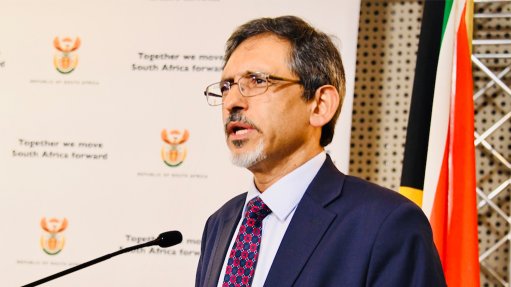
Minister of Trade, Industry and Competition Ebrahim Patel
Ministers from the largest economies – including the US, China, the EU, India, Japan, Brazil and Indonesia – attended the G20 Trade and Investment Ministers meeting earlier this week, where they took a stance to support economic diversification.
South Africa was the only country representing the African continent at the meeting.
The G20 Trade and Investment Ministers adopted a Communique on ‘Realizing Opportunities of the 21st Century for All’, where they committed to use all available policy tools to minimise the economic and social damage of the pandemic, restore global growth, maintain market stability and strengthen resilience.
The meeting was initiated by South African Minister of Trade, Industry and Competition Ebrahim Patel, who called for the G20 Trade Ministers to recognize the need for greater policy space in global trade rules to promote African industrialisation.
The meeting focused on current international trade and investment developments including Covid-19; the future of the World Trade Organization (WTO); boosting micro, small and medium enterprises; pathways to economic diversification, as well as strengthening international investment.
“I warmly welcome the meeting’s agreement to support economic diversification and look forward to joint efforts to achieve it. This should include WTO reform that addresses imbalances in the rules that emerged from the Uruguay Round, to allow for legitimate measures to support industrial development and to provide policy space for digital economy development on the African continent to drive economic growth and development,” Patel said.
For Africa to overcome the challenges caused by the Covid-19 pandemic, more investment flows, economic diversification and greater policy space is required, he added.
He said while all countries are facing challenges because of the pandemic, those economies with greater fiscal or financial vulnerability or with higher levels of infection will be most affected.
While he affirmed that global trade be underpinned by the principle of special and differential treatment for developing countries, Patel also welcomed the meeting’s consensus to promote women’s economic empowerment and the efforts of micro, small and medium enterprises.
“I recognize the importance of continuing to foster women’s economic empowerment with a view to achieving global economic recovery, and endorsed a set of guidelines to promote inclusive economic growth through increased participation of small and medium enterprises in international trade and investment,” he said.
Pointing to the agreement by Trade Ministers on the risks of illicit trade, Patel drew attention to the unresolved problems of under-invoicing and other illicit actions in international trade, which damage the national industrial capacity of many African manufacturers.
This, he said, must be addressed vigorously in the future G20 Trade Track.